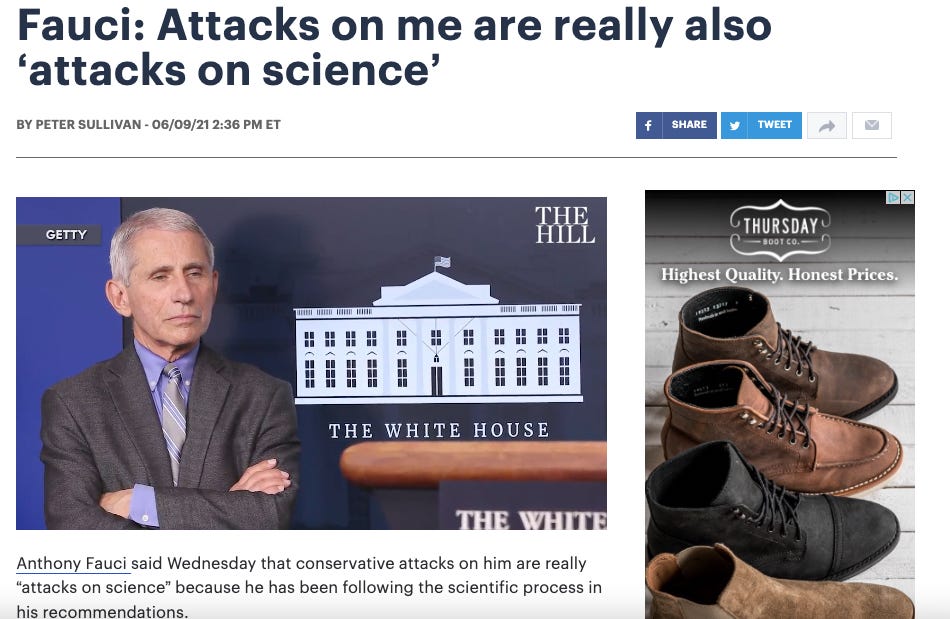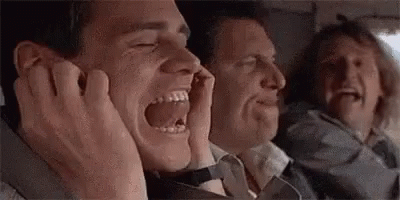Why We Trust Science and Experts
This is going to be short and sweet. Not a lengthy, citation and analysis-filled exploration of the topic, but a simple observation about reality.
We trust science because it provided us with observable and demonstrable benefits in the real world, and explanations of things that ported to reality, many times, over many years. Sure it got things wrong, but the method itself was self-correcting as long as anyone could throw their ideas into the ring. Experts and engineers, utilizing the scientific method (often in an informal, non academic manner), were able to give us cell phones and cars, indoor plumbing and air conditioning, airplanes and abundant food, antibiotics and anesthesia. For all their fancy technical language, theorizing, huge equations on chalkboards - we wouldn’t trust or believe any of it if it didn’t deliver tangible things we could observe with our own senses. We didn’t have the things listed above, and then we did. It was easily observable and demonstrable. Thus the cache of goodwill, and reputation of science as a good thing to be trusted, built up.
Though the scientific method is excellent, humans are corruptible, and there are too many cases of this throughout history to require any links, though I have provided many and will provide more in other articles. But this simple fact means that sometimes people will use the cache of goodwill and reputation of science to push nonsense or junk, and many people will trust them for a while because they have the right credentials, speak the right buzzwords or catchphrases, or have the ear of the right people in power.
True believers will rise to their defense, mistaking a specific expert or even temporary consensus of experts for the scientific method itself - a sort of godless transubstantiation, wherein the experts become science itself.
Science is a process, a method to be followed to discover empirical things about the world around us. It is not a person, a group of people, or a set body of facts.
When someone who is supposedly an expert gets things wrong, repeatedly and without acknowledging it and then working that new knowledge into his methodology or system, then he isn’t actually an expert. There MUST be some externally valid way to evaluate and critique an expert without relying on the expert himself, or his comrades, else we’ve set up the ultimate unfalsifiable system of belief, the opposite of science itself.
A great recent example of this is various martial arts masters, including some who claimed to be able to move people around and knock them out with pure energy. As soon as they all got into the ring with a competent MMA fighter, they and their true believer acolytes were dismayed to discover the weakness of their expertise. You can find videos like this all over, so here’s just one example showcasing some of these masters getting easily owned by a competent fighter:
As Ayn Rand said: “You can ignore reality, but you cannot avoid the consequences of ignoring reality.”
It seems obvious to me that our current institutional expert class is in the process of ignoring reality, and closing their eyes to the consequences of ignoring reality and saying I can’t hear you lalalalalala.
If an expert can’t show his work, can’t show a clear and convincing display that his supposed expertise translates to real world results, but instead relies on appeals to credentials, authority, and complexity - then he is no true expert. Look at how well people like Richard Feynman or Milton Friedman, Nobel prize winners both, were able to communicate the immense complexities of physics & economics to laymen in a way both understandable and interesting.
If you watch their lectures, thankfully still available online, neither typically appealed to complexity or credentials, and both relished in interacting with their audiences rather than talking down to them for their lack of physics or economics PhDs. They won fame and acceptance because of their ability to show their work, to connect their theories to reality, not by simply appealing to the complexity of their fields and the stupidity of the rubes.
And of course neither was infallible. Though I like Friedman’s work as a public intellectual speaking on behalf of free markets, I don’t find his technical work about money or monetary policy as convincing as the Austrian School’s take, for example.
Feynman famously replied to a student who used his book and received a bad mark for giving an answer based on it, that he (Feynman) got something wrong. The exchange is illuminating when compared to today’s near-worship of experts and denigration of anyone without credentials and/or consensus backing to challenge them:
The student, Beulah Elizabeth Cox, wrote to Feynman in 1975:
I recently took a course in elementary physics at the College of William and Mary in Virginia. An exam question concerned Gauss' Law and conductors, namely, does a hollow conductor shield the region outside the conductor from the effects of a charge placed within the hollow but not touching it?
I read Chapter 5, Volume II of the Feynman Lectures on Physics, and understood all except the next to the last paragraph in which you say “… no static distribution of charges inside a closed conductor can produce any fields outside.” This was confusing, as it seemed to contradict all your previous statements. My instructor showed me how a simple application of Gauss' Law, with a surface of integration enclosing the entire conductor, shows that the E vector outside the conductor is not zero.
Could you perhaps explain what the paragraph in question means? I would greatly appreciate a reply as I am now very confused.
PS: I must admit I have a devious motive in writing to you because on the exam I answered with the explanation that your book gave. However my instructor did not give me any points, even after I found your book to validate my answer. If you could clarify this question for me I would be very appreciative. Thanking you in advance.
Feynman’s reply is legendary:
Your instructor was right not to give you any points, for your answer was wrong, as he demonstrated using Gauss’ law. You should, in science, believe logic and arguments, carefully drawn, and not authorities. You also read the book correctly and understood it. I made a mistake, so the book is wrong. I probably was thinking of a grounded conducting sphere, or else of the fact that moving the charges around in different places inside does not affect things on the outside. I am not sure how I did it, but I goofed. And you goofed, too, for believing me.
Contrast this to the expert-class scientists of today, like Neil DeGrasse Tyson, who has appealed to consensus and “the system” in multiple interviews in the past year, or Anthony Fauci who likened attacks on himself to attacks on science itself.
The reason trust in Capital S Science is crumbling is precisely because it became Capital S Science, instead of science, the rigorous adherence to the scientific method that welcomes all challenges and comers.
What we build out of the ashes of this crumbling of trust is now up to us, but I don’t think there’s any putting this toothpaste back in the tube.







